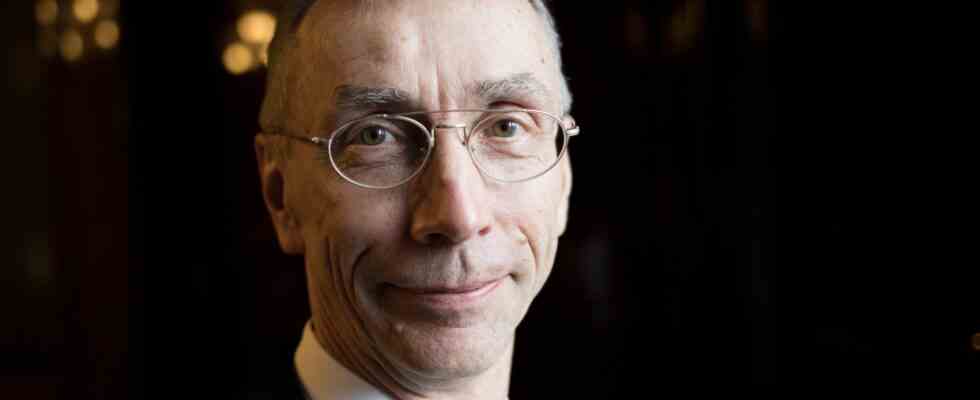Status: 03.10.2022 2:40 p.m
What makes us uniquely human? Svante Pääbo has done groundbreaking research, including sequencing the Neanderthal genome. The Swede, who conducts research in Leipzig, received the Nobel Prize in Medicine for his work.
This year’s Nobel Prize in Physiology or Medicine goes to the Leipzig-based Swede Svante Pääbo for his findings on human evolution. This was announced by the Karolinska Institute.
Pääbo is honored for his insights into human evolution. He is Director and Scientific Member at the Max Planck Institute for Evolutionary Anthropology. Pääbo is considered one of the most cited scientists of the present. Among other things, he proved that DNA fragments – i.e. genetic material – can survive for hundreds of thousands of years.
Groundbreaking research results
In 1997, Pääbo was the first researcher to sequence the Neanderthal genome. Result: The DNA of the Neanderthals differs significantly from that of modern humans. Science owes Pääbo the insight that, contrary to earlier assumptions, Neanderthals are not a direct ancestor of humans.
Science editor Anja Martini, NDR, in conversation with Medicine Nobel Prize winner Svante Pääbo
tagesschau24, October 3, 2022
His comparisons of the Neanderthal genome with that of modern humans revealed that when they met around 50,000 years ago they must have fathered offspring together – at a time when modern humans were leaving Africa and emigrating to Europe and Asia. The result: “Each of us carries about one to two percent of Neanderthals in us,” says the Swede.
It was also Pääbo who discovered the so-called Denisova man. In 2012, his team decoded the genome from a bone they found in Denisova Cave in western Siberia’s Altai Mountains and discovered that it came from a previously unknown group of prehistoric humans. The Denisovans were distantly related to the Neanderthals.
New scientific discipline
His groundbreaking research led to the new scientific discipline of paleogenomics, the Nobel Prize committee said in its justification. By uncovering genetic differences that distinguish all living humans from extinct hominids, his discoveries provided the basis for exploring what makes humans uniquely human.
Pääbo himself describes his scientific approach as follows: “If we want to know what is exclusively human about our genome, then we should ask ourselves: What are the genetic changes that we all have in common, but not the Neanderthals?” There are about 31,000 such differences. “The recipe for incarnation must be hidden in these changes.”
Nobel Prize in Medicine goes to Swedish evolutionary scientist Pääbo
David Beck, SWR, daily news at 8:00 p.m., October 3, 2022
But what it looks like remains unclear: “I think that we will be busy for at least another ten or twenty years identifying these crucial DNA differences that make us unique,” believes the scientist. It could also explain why modern humans developed a complex culture and technology that enabled them to colonize almost the entire world.
“In hundreds of thousands of years, the Neanderthals hardly developed their stone tools. They probably had no interest in painting cave walls. And they never crossed the sea,” says Pääbo. Modern humans, on the other hand, colonized every island in the Pacific in just 65,000 years.
“Overwhelmed, speechless and very happy”
Pääbo was “overwhelmed, speechless and very happy” on the phone, reported the secretary of the Nobel Assembly at the Stockholm Karolinska Institute, Thomas Perlmann, at the announcement. Pääbo asked if he could tell someone about the award before it was announced. He then told him that it was okay to tell his wife about it, Perlmann said.
This year’s Medicine Nobel Prize winner is the son of a previous Nobel Prize winner in the same category: Pääbo’s father is Sune Bergström, who was awarded the 1982 Nobel Prize in Medicine along with two other researchers for “discoveries relating to prostaglandins and related biologically active substances”.
When the Nobel Prize stays in the family
It occasionally happens that related researchers are awarded Nobel prizes. The most famous example is the Curie family: Marie Curie was awarded both the Nobel Prize in Physics in 1903 and that in Chemistry eight years later. Two other researchers received the physics prize with her, including her husband Pierre Curie. Later, their daughter Irène Joliot-Curie was also honored with the Nobel Prize – she received the Nobel Prize in Chemistry in 1935 together with her husband Frédéric Joliot.
There is also a German research family that has two Nobel Prize winners in its ranks: Last year, Benjamin List won the Nobel Prize in Chemistry. He is the nephew of Christiane Nüsslein-Volhard, the first and so far only German woman to receive the Nobel Prize in Medicine – that was in 1995.
Endowed with ten million crowns
The most important award for physicians this year is endowed with ten million Swedish crowns (around 920,000 euros). Since 1901, 224 people have received the Nobel Prize in Medicine, including just 12 women. The first went to German bacteriologist Emil Adolf von Behring for discovering a therapy for diphtheria.
Last year, David Julius (USA) and Lebanese-born researcher Ardem Patapoutian received the award. The two discovered cell receptors that humans use to sense temperature and touch.
Awarded on December 10th
The Nobel Prize series started with the Medicine Prize. The winners of the physics and chemistry prizes will be named on Tuesday and Wednesday. The announcements for the Nobel Prize in Literature and Peace will follow on Thursday and Friday. The series ends next Monday with the so-called Nobel Prize in Economics, donated by the Swedish Reichsbank.
The ceremonial presentation of all awards traditionally takes place on December 10th, the anniversary of the death of the award donor Alfred Nobel. Last Thursday, the Right Livelihood Foundation announced the winners of this year’s Alternative Nobel Prizes.
Medicine Nobel Prize winner teaches in Leipzig and Munich
Holger Senzel, ARD Stockholm, October 3, 2022 12:02 p.m

